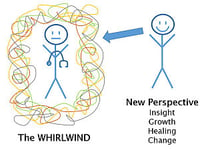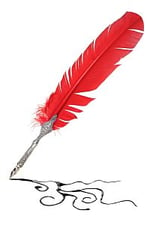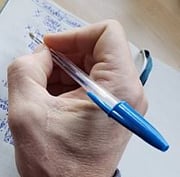 Putting pen to paper in a personal journal is a powerful burnout prevention tool for doctors ...
Putting pen to paper in a personal journal is a powerful burnout prevention tool for doctors ...
- and the research says a keyboard is not a substitute for pen to paper.
The unexamined life is not worth living ~~ Socrates
The palest ink is better than the best memory ~~ Chinese proverb
One of the best ways to step out of the whirlwind of your daily life is to develop the habit of journaling about your experience.
Every single time you pick up your journal you put a process in motion that supports you building a more meaningful life and and practice. Writing in your journal automatically transports you to a new perspective, outside the whirlwind of ordinary events. You pause and reflect.
The notes in your journal come from a new level of consciousness rather than the day-to-day rat brain of survival. Problems and dilemmas can be seen much more clearly and new action steps stand out like neon lights.
No problem can be solved from the same level of consciousness that created it ~~ Einstein
It all happens so fast it is easy to miss the power of process. Let's slow things down and take a closer look.
Here are the steps to journal self-reflection:
 1) STOP the Whirlwind
1) STOP the Whirlwind
- Stop what you are doing
- Break the habit patterns
- Step out of this reality/struggle
- Establish a new perspective
2) WRITE it Down
- Journal about your experience
- Put pen to paper - I will show you why that is more powerful than digital/typing
- Slow down and sift through your thoughts and experiences to decide what to write
- New insights come to the surface when you are in this "altered state"
3) STEP INTO THE NEW PERSPECTIVE
- See and document what is really going on
- Look at your practice from outside the whirlwind and document what you are noticing, perhaps for the first time
- Exercise your Meta-awareness muscles
- Notice what is working and what is not
4) CHOOSE WHAT TO DO NEXT
Make a conscious decision about what to do next rather than acting on reflex/habit. This is the only way out of Einstein's Insanity Trap.
Make a conscious choice about what you want to:
- Start doing
- Stop doing
- Keep doing
NOTE:
If you are clear on your Ideal Practice Description, these steps will take you closer and closer to your Ideal Practice over time. (Starts on Page 70 in the book)
 Why Pen and Paper?
Why Pen and Paper?
I have always had three personal reasons for real ink on real paper
1) STATE CHANGE
A lot of our work is done on keyboards and computers. It is difficult to make the energy shift to self reflection if we are using the same technology.
So pulling out your journal and writing with a pen are a complete break from hammering your patient notes in EPIC. It drives the new level of consciousness
2) ALCHEMIST'S FIRST STEP
Building your life is a form of alchemy. You take an idea that exists only in your head, and translate it to living form in the 3D space of reality.
Quick example: at one point you made a decision to apply to medical school - you may have even written about your decision in your journal back in the day. Back then it was just a thought, a desire that lived only in your imagination. Now you have translated that simple idea into a complete career in real life. Alchemy.
If you want to make any change in your life, stating your desire by putting a pen to paper creates is the first translation into the real world. A desire is born in your journal and - unlike an image on a computer monitor - your journal entry is real. It exists in the 3D world of reality. The strokes of ink on paper are real.
 3) MY BIC CRYSTAL JUST FEELS GOOD
3) MY BIC CRYSTAL JUST FEELS GOOD
I like the feel of a blue BIC Crystal ball point pen in my hand. Finest writing instrument ever made. Leaves a big writers callus on my middle finger. Hurts just a little so I know I am alive. Just sayin'.
Now there is research evidence that pen and paper are better than digital
Remember journaling is not like taking notes in a class. Writing in your journal is a reflection on the very substance of your reality -- distilling your thoughts and feelings into the words on the page. Quantity is not the point. And even if it were, pen and paper win over keyboard and WORD.
I have just started a Bullet Journal. It is a journal method that maximizes both efficiency and self reflection. In his book "The Bullet Journal Method", Ryder Carroll the originator of the method has this to say about pen and paper. Links below will give you the journal and popular article references.
"Handwriting accelerates and deepens our ability to form and recognize characters and stimulates our minds more effectively than typing.
It activates multiple regions of the brain simultaneously, thereby imprinting what we learn on a deeper level. As a result we retain information longer than we would by tapping into an app.
The fact that it takes longer to write things out by hand gives handwriting its cognitive edge."
Here are three articles that document the brain differences between my BIC Crystal and my Microsoft Ergonomic Keyboard model 3RA-00022.
1) Why handwriting is still essential in the keyboard age
NY Times 6-20-2016
https://well.blogs.nytimes.com/2016/06/20/why-handwriting-is-still-essential-in-the-keyboard-age/
2) The pen is mightier than the keyboard
Psychological Science, 2014, 29(9), 1565-1568
https://pdfs.semanticscholar.org/6b6a/25a7a6d95056530eee02bf0aba3692e1c73c.pdf
3) To remember a lecture better, take notes by hand
The Atlantic May 2014
===========
PLEASE LEAVE A COMMENT
- How often do you journal?
- What is your favorite writing instrument?
- What difference does your journal habit make in your life?

